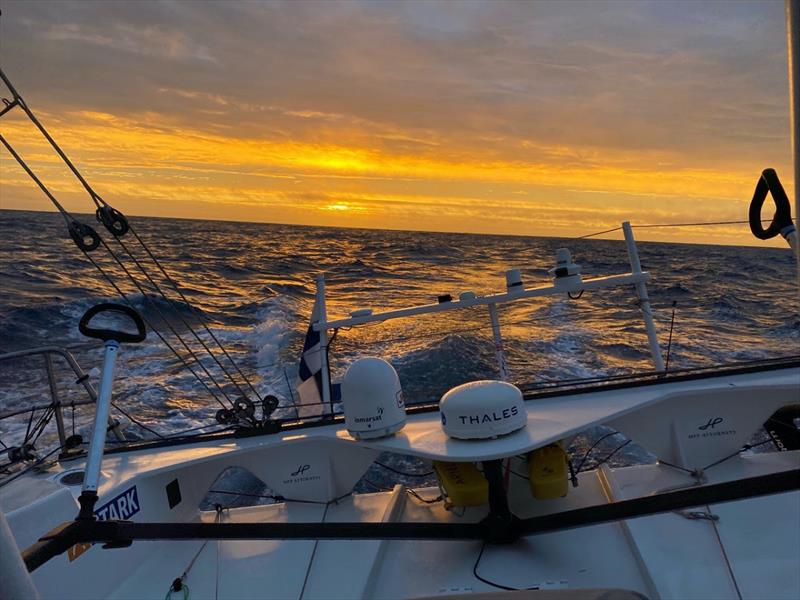
Sailing around the world while remaining self-sufficient
by Maire Launay / IMOCA 26 Jan 2021 01:38 PST

Ari Huusela on Stark during the Vendée Globe © Ari Huusela / Stark
They will shortly be finishing. The first boats home in the Vendée Globe will be crossing the finish line off Les Sables d'Olonne on Wednesday. One of the first elements to be checked after around eleven weeks at sea, even before the boat is moored up in the harbour, will be the lead seal on the engine.
While the skippers have a generator aboard their IMOCA, the propeller must remain sealed as wind is the only permitted source of propulsion. An engine is therefore there for safety reasons only, and the wind is the only fuel for the solo sailors.
It is thanks to the power of the weather systems around the world in conjunction with the technological innovation of the past thirty years, that an IMOCA skipper can cross the Atlantic in ten days or sail around the world in less than eighty days, while remaining self-sufficient in terms of energy.
To survive alone in this hostile environment, to eat, drink, study the weather or ensure that everything aboard the boat is working smoothly, the skipper has to generate his own electricity and manage his reserves down to the smallest detail. In the Southern Ocean, a solo sailor only sleeps for five hours out of 24 and needs 5000 calories of food each day, which is around double the requirement of someone ashore. But while an average citizen in the Western world consumes 148 litres of fresh water per day on average, aboard an IMOCA the skippers only have around 4 litres at their disposal to drink, rehydrate their freeze-dried food and to clean themselves up.
Self sufficient in energy
IMOCAs create energy thanks to the power of the water, wind or sun. Since 2012, the skippers have tried to reduce their use of diesel fuel when recharging their batteries. Even if the engine remains compulsory in case of any problems (assistance, serious damage, when other energy sources fail), its use remains very limited. "Yannick had to start his engine a few times in the South, in particular to warm up the inside of his boat," declared Jean-Marie Dauris, technical director for the Maître CoQ IV team.
If we listen to what the skippers tell us, renewable energy sources have become the most virtuous solution, when looking at how to combine performance, weight saving and the protection of the environment. Today, equipped with ever more sophisticated technological tools (navigation console, radar, canting keel, fresh water maker, wi-fi and other communication systems, etc), IMOCAs have become increasingly intelligent, but also require more and more energy. With an average consumption of 10 to 12 amps per hour, each team had to rethink how to produce energy. With hydrogenerators, wind turbines and solar panels, today's IMOCAs manage to move increasingly away from fossil fuels.
In 2020, 90% of the fleet is equipped with hydrogenerators. These propellers developed by the firm founded by Yannick Bestaven, Watt&Sea, have revolutionised energy management on board the boats. "The hydrogenerator works practically all the time. It is more efficient to use that than charge using the normal generator, as the hydrogenerators keep the batteries charged, create very little drag and offer weight savings. The use of these alternative energy sources is justified by ecological benefits and performance gains. We try to fight against every little kilo and of course, filling up with 200 litres of diesel for fuel, does not fit in well with that argument,"added Jean-Marie Dauris.
Although not yet that common, other energy production systems are being developed. Ten boats are equipped with solar panels and four with a wind turbine. Watt&Sea is currently developing a wind turbine model with a completely watertight alternator, a propeller surface that is 25% smaller than those found on the turbines available in stores and a leeward design that makes it very stable in big waves. "The wind turbine today offers support to the hydrogenerator, and cannot yet replace it. It already works well on the Ultim boats, but the speed and configuration of the monohulls are not the same, so the development needs to continue," concluded Jean-Marie.
Water and food management
This self-sufficiency is also true when we look at supplies. Once they have cast off, the sailors no longer have any means of being supplied with water or food. As far as meals are concerned, everything is planned beforehand by the teams, practically down to the requirements for each day. As for water, that is a different story. It is impossible to bring massive amounts of water aboard or to run the risk of running out. Therefore all the IMOCAs are equipped with desalinators. This device, which enables the salt to be removed from seawater so it may be drunk, also avoids as far as possible the need to take plastic bottles aboard, and is a requirement under IMOCA class rules. To be precise, it is stipulated that "It is compulsory to have a desalinator which works manually and electrically aboard the boat. For races that are longer than 5000 miles, two desalinators both working manually and electrically must be installed aboard, one of which must remain in place."
Thanks to all the different innovations, the boats are becoming increasingly self-sufficient in terms of energy, which is a key factor in the quest for responsible and high performance sailing. The means installed aboard the boats are therefore designed to offer complete self-sufficiency, which means that sailors are able to finish their races today without worrying about supplies. As Jean Le Cam says in our film about this subject, "When we sail with solar panels and hydrogenerators, we can make water. We are completely self-sufficient and could sail around the world four times."
Find out more...